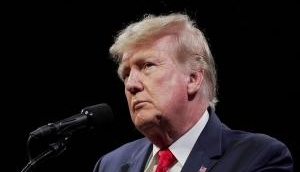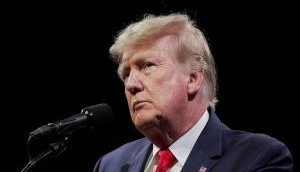Is Pakistan's action against Hafiz Saeed and his JuD just for show?

Invoking "United Nations Security Council 1267 sanctions", Pakistan has put Hafiz Saeed's Falah-e-Insaniyat Foundation and Jamaat-ud-Dawa on a watch list. Saeed and four of his associates are being held in preventive detention under the country's Anti-Terrorism Act.
Does this step indicate that the Nawaz Sharif government and the Pakistan Army have finally decided to drop the instrument of terrorism from the country's security doctrine? Or is it only a tactical move in the face of concerted international pressure?
This is not the first time Saeed has been detained by the authorities. Nor is it the first time Pakistan has taken action against an organisation led by him. He was taken into custody after the attack on India's parliament in 2001, the Mumbai train bombings in 2006 and the 26/11 Mumbai attack. But every time, he was set free either by the government or under court orders. In fact, Pakistani authorities have been simply unwilling to proceed purposefully against their asset. And while they took action against the Lashkar-e-Tayyiba, of which Saeed is the true leader, they allowed the organisation to virtually operate under a new name - Jamaat-ud-Dawa. Worse still, Pakistani leaders claimed that the JuD was a charitable organisation.
Also Read: Lashkar-e-Taiba, JuD, FIF and the Hafiz Saeed connection
Saeed was put on the UN 1267 terrorist list in December 2008. He has since been proclaimed as a terrorist by many countries, including the United States. Yet, Islamabad has allowed him to move freely in the country and make vituperative and venomous statements such as asking the people to undertake jihad against India. It has also permitted the LeT surreptitiously and the JuD fairly openly to collect funds and recruit Pakistani youth for the so-called Kashmir jihad. Under the patronage and with the help of the Pakistan Army and its intelligence agency, the ISI, LeT terrorists are sent into Kashmir and elsewhere in India to launch attacks. There is little doubt about their role in fanning of the protests that broke out after the killing of the terrorist Burhan Wani in Kashmir last July.
All through these past years, Pakistan turned a deaf ear not only to Indian demands for action against Saeed and the JuD but also those of the US and important Western countries. Why has it moved now?
A section of the Pakistani media reported that the US recently warned Islamabad that it would take action in the financial sector if the country did not stop the flow of funds into the JuD accounts. This threat emanated from a report of the Asia-Pacific Anti-Money Laundering Group, which showed that Pakistan was not implementing anti-terror financial sanctions by freezing the assets and attaching properties of terrorists. If the US acts on its threat, Pakistan's international financial transactions may face impediments.
Interestingly, China sought to defend Pakistan in the Anti-Money Laundering Group but failed in the face of Indian and US opposition.
The US warning was given before President Donald Trump took office. With Trump moving unconventionally and controversially on terrorism, Pakistan is wary, hence the action against Saeed. At the same time, Pakistan would be aware that Trump's primary focus would be on Pakistani support for the Taliban, including the Haqqani Network. They are the major players in the Afghan conflict. The LeT is involved in Afghanistan but its primary focus is India, especially Kashmir.
Also Read: Indo-Pak peace roadmap: don't let security establishments dictate foreign policy
Pakistan's all-weather friend China has given it cover on terrorism-related issues. This is best seen in its refusal to allow India's request for the chief of the Jaish-e-Mohammad, Masood Azhar, to be designated a terrorist by the UN terrorism committee. China though realises that it is paying a diplomatic price for supporting Pakistan on Azhar. There are reports that Beijing is counselling Pakistan that it needs to move against all terrorists. China is furthering its strategic and economic interests in Pakistan through the China Pakistan Economic Corridor, and it knows that improved India-Pakistan ties would be beneficial for the CPEC.
India has consistently asked that the JuD be banned and that Hafiz Saeed's activities be curbed. The Pakistan Army, however, has ensured that India's demands are brushed aside. Besides, Nawaz Sharif is personally committed to the "Kashmir cause" and has previously expressed sympathies for those who send terrorists there. However, over the past few years, Sharif seems to have realised that Pakistan's economic future demands on improved ties with India as well as on the erosion of Pakistan's image as the global epicentre of terrorism and extremist ideologies.
To project Pakistan as a moderate Islamic state, Sharif recently visited the important Hindu pilgrimage place Katasraj. He instructed that it should be properly maintained. Sharif also named the Qaid-e-Azam University's Physics centre after Abdus Salam, Pakistan's only Nobel Laureate who has been largely been ignored because he was an Ahmadi. Both these measures have irked the orthodox Mullahs.
General Qamar Bajwa, who took over as the Pakistan Army chief in late 2016, has sought to cool the temperature along the Line of Control even while maintaining the army's traditional approach towards India. He is obviously showing the same pragmatism in going along with Sharif in the action against Hafiz Saeed. Both the government and the army also want to show that India is aggressive and negative while Pakistan is taking steps that should enable the resumption of the dialogue. This is what Pakistan has projected through 2016 and wishes to impress upon a the US administration.
For India, the action against Saeed will be meaningful if it is part of a series of moves against other terrorist groups such as the Hizb-ul-Mujahideen and the Jaish-e-Mohammad and end to the infiltration of terrorists into India. It will also have to be supported by actions on other fronts such as normalising of trade ties with India. Until that happens, India should only consider the action against Saeed as tactical and temporary and maintain its present stance on dialogue with Pakistan. And it should not be reluctant in publically stating this position.
Also Read: Iran's Chabahar port: India needs to side-step a few Pak-China landmines






![BJP's Kapil Mishra recreates Shankar Mahadevan’s ‘Breathless’ song to highlight Delhi pollution [WATCH] BJP's Kapil Mishra recreates Shankar Mahadevan’s ‘Breathless’ song to highlight Delhi pollution [WATCH]](https://images.catchnews.com/upload/2022/11/03/kapil-mishra_240884_300x172.png)

![Anupam Kher shares pictures of his toned body on 67th birthday [MUST SEE] Anupam Kher shares pictures of his toned body on 67th birthday [MUST SEE]](https://images.catchnews.com/upload/2022/03/07/Anupam_kher_231145_300x172.jpg)






